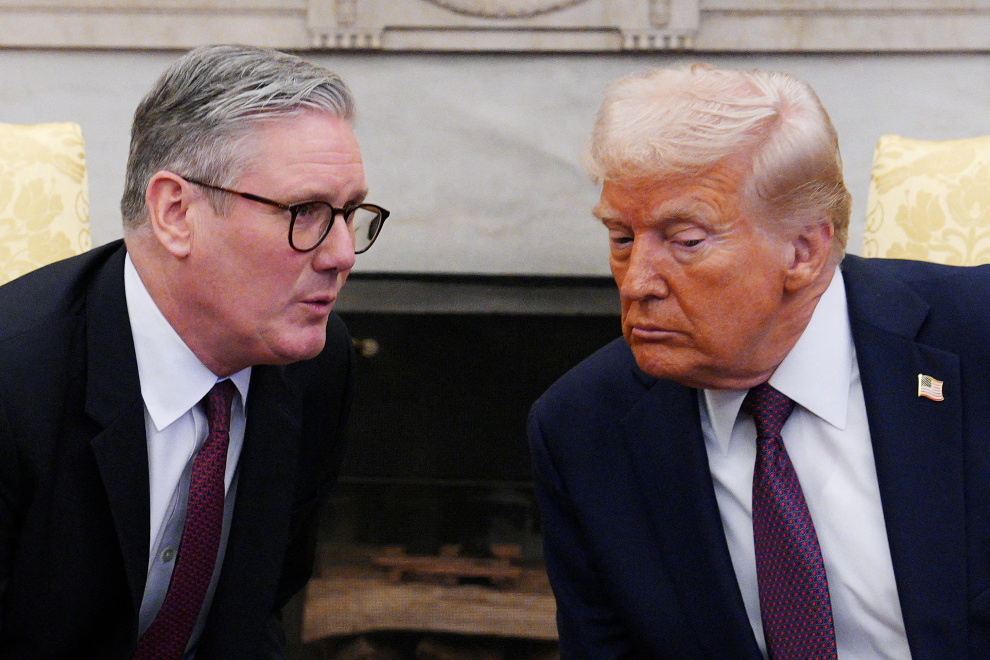The UK is preparing for the impact of new US tariffs set to be announced on Wednesday, with Downing Street indicating that a deal to exempt British goods is unlikely to be secured in time.
US President Donald Trump has signalled his intention to impose a fresh wave of tariffs – or import taxes – on 2 April, adding to the 25% levy on cars and car parts that has already been confirmed. Over the weekend, he suggested that these tariffs would apply to all countries, rather than targeting those with the biggest trade imbalances with the US.
The Prime Minister’s official spokesman described ongoing discussions on a potential economic deal between the UK and the US as “constructive” but did not rule out retaliatory measures if tariffs were imposed on British goods.
“When it comes to tariffs, the Prime Minister has been clear he will always act in the national interest, and we have been preparing for all eventualities ahead of President Trump’s announcement, which we expect to impact the UK alongside other countries,” he said.
“We are having constructive discussions on a US-UK economic prosperity deal, but we will only agree to a deal that delivers economic benefits for the British people and serves the national interest.”
Asked whether a deal to prevent tariffs was likely before Wednesday, the spokesman said talks between the two countries “will likely continue beyond Wednesday.”
He added that the UK would adopt a “calm and pragmatic approach” in response to any tariffs, stating that “a trade war with the US is not in anybody’s interests.” However, he also stressed: “We rule nothing out in response.”
Political Reactions
Conservative Shadow Trade Secretary Andrew Griffith MP criticised the government’s handling of the situation, saying: “This news is potentially a hammer blow not just to British businesses and workers but to [the Prime Minister’s] own Chancellor, whose creative accounting at the emergency budget fails to include the impact of tariffs.
“Labour claims talks with the US are going ‘well’. But if this is what ‘well’ looks like, I wouldn’t like to see what the opposite looks like. The Prime Minister has so far failed to deliver; he needs to rekindle our US trade deal.”
The Liberal Democrats have urged the government to respond with reciprocal tariffs, in line with actions taken by Canada and the European Union. Party leader Sir Ed Davey said: “Just asking nicely clearly doesn’t work with Trump, so we have to stand tall with our allies in Canada and Europe and show that we will not be bullied.
“That means being prepared to impose reciprocal tariffs if necessary, including on Elon Musk’s Teslas, and urgently negotiating a better trade deal with the EU to show Trump we have alternatives.”
The developments follow a phone conversation between Prime Minister Sir Keir Starmer and President Trump on Sunday, with Downing Street describing their discussions on an economic deal as “productive.”
Economic Impact and Potential Retaliation
The UK government has argued that it maintains a relatively balanced trade relationship with the US compared to other countries. However, the independent Office for Budget Responsibility (OBR) has warned that a trade war could severely impact the UK economy.
According to the OBR’s latest economic forecast, published on Wednesday, GDP could be 0.6% lower than expected this year and 1% lower next year in the most severe scenario, in which the UK and other nations impose retaliatory tariffs. If the UK refrains from retaliation, the OBR predicts a smaller reduction in growth, with GDP 0.4% lower this year and 0.6% lower next year.
It remains unclear how the UK would respond if Trump’s tariffs come into force. Potential options include duties on sectors where British exports are crucial to the US market or targeted measures on specific products, such as Harley-Davidson motorcycles.
UK car exports, valued at approximately £7.6bn per year, are particularly vulnerable, with the US being the second-largest market for British-made cars after the European Union, according to the Society of Motor Manufacturers and Traders (SMMT). The new tariffs are expected to hit British luxury car manufacturers, including Rolls-Royce and Aston Martin.
Trump has defended his tariff strategy, arguing that it will benefit American manufacturers and protect domestic jobs, despite warnings that it could lead to higher prices for consumers.
During a meeting at the White House last month, Trump hinted at the possibility of “a real trade deal” with the UK, suggesting that Britain could avoid the kind of tariffs he has threatened against other nations.
UK braced for Trump tariffs as Downing Street warns deal unlikely













